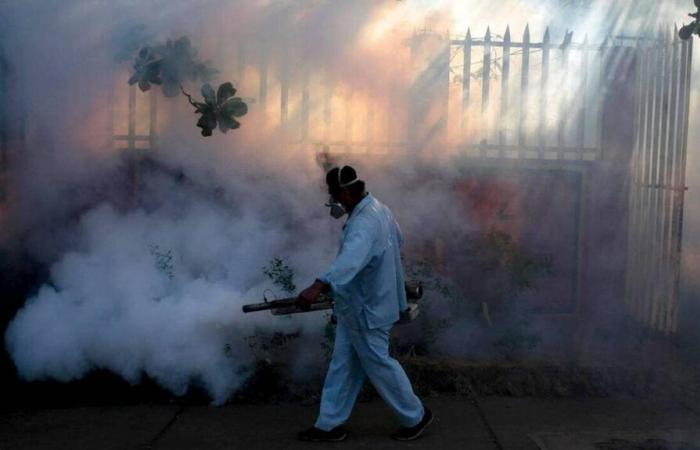To measure how climate change affects health, “Dengue is a very good disease to study because it is very sensitive to climate”estimates Erin Mordecai, an ecologist specializing in infectious diseases at Stanford University.
Transmitted by the bites of infected tiger mosquitoes, this viral disease, which can cause high fever and body aches, is generally mild but sometimes serious, even fatal.
Read also: Dengue. A bacteria injected into mosquitoes to stem the virus
Endemic in more than 130 countries
Dengue is already endemic in more than 130 countries and with rising temperatures, the mosquito vectors are spreading beyond the tropical and subtropical areas where they were generally confined.
For this new study, presented at the annual meeting of the American Society of Tropical Medicine and Hygiene but not yet peer-reviewed, a team of researchers looked at the incidence of dengue and climatic variations in 21 countries in Asia and the Americas.
They estimated that about 19% of current dengue cases on average worldwide “are attributable to global warming”summarized Erin Mordecai, lead author of the study unveiled while the 29th is taking place in Azerbaijan.e UN climate conference.
Temperatures between 20 and 29 degrees Celsius are most conducive to the spread of the disease and endemic areas in this setting – parts of Peru, Mexico, Bolivia and Brazil – could see a rise of 150 to 200%. infections in the coming decades.
Globally, at least 257 million people currently live in areas where global warming could cause the incidence of dengue fever to double over the next 25 years.
Read also: Dengue fever: infected tiger mosquitoes captured in mainland France, a scientific first
Bacteria to the rescue
Over the first eight months of 2024, there were nearly 13 million cases of dengue fever, according to the World Health Organization, almost double the record recorded for all of 2023.
The real number is probably closer to 100 million seen “massive under-declarations” of cases, in particular lack of tests or symptoms, estimated Erin Mordecai.
The study is also presented shortly after the start of a new epidemic in Guadeloupe, a French region in the Antilles.
In addition to climate change, the globalization of trade and travel as well as the advance of urbanization favor the spread of tiger mosquitoes.
One promising approach to combating dengue fever involves introducing mosquitoes into the wild that are infected with bacteria that block the insect’s ability to transmit the virus.
Mosquitoes infected with Wolbachia bacteria were introduced five years ago into most of the Brazilian city of Niteroi, reports another study presented at the annual meeting, not peer-reviewed.
In 2024, as Brazil faced its largest dengue epidemic, this city near Rio de Janeiro saw only a slight increase in cases, although the number remained 90% lower than it was. before this experiment and incommensurate with the rest of the country.
Evidence that the bacteria “Wolbachia may provide lasting protection against increasingly frequent dengue outbreaks globally,” according to Katie Anders, one of the leaders of the Global Mosquito Program, quoted in a press release.
Already, the program “partnered with the Brazilian government to build a Wolbachia mosquito production site, which will enable simultaneous deployment in multiple cities to protect several million people”indicated a Brazilian project manager, Luciano Moreira.






